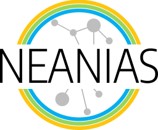The work “Novel EOSC Services for Space challenges: the NEANIAS first outcomes” by NEANIAS Space team has been published in January 2021.
"Novel EOSC Services for Space challenges: the NEANIAS first outcomes"
- Authors: Eva Sciacca [1], Mel Krokos [3], Ugo Becciani [1], Cristobal Bordiu [1], Filomena Bufano [1], Alessandro Costa [1], Carmelo Pino [1], Simone Riggi [1], Fabio Vitello [1], Carlos Brandt [2], Angelo Rossi [2], Eugenio Topa [4], Simone Mantovani [5], Laura Vettorello [5], Thomas Cecconello [6] and Giuseppe Vizzari [6].
- Affiliations: [1] Istituto Nazionale di Astrofisica (INAF), IT; [2] Jacobs University Bremen, DE; [3] University of Portsmouth, UK; [4] Aerospace Logistics Technology Engineering Company (ALTEC) Spa, IT; [5] Meteorological Enviromental Earth Observation (MEEO) Srl, IT; [6] University of Milano-Bicocca, IT.
Abstract.
The European Open Science Cloud (EOSC) initiative faces the challenge of developing an agile, fit-for-purpose, and sustainable service-oriented platform that can address the evolving needs of scientific communities. The NEANIAS project plays an active role in the materialization of the EOSC ecosystem by actively contributing to the technological, procedural, strategic and business development of EOSC. We present the first outcomes of the NEANIAS activities relating to co-design and delivery of new innovative services for space research for data management and visualization (SPACEVIS), map making and mosaicing (SPACE-MOS) and pattern and structure detection (SPACE-ML). We include a summary of collected user requirements driving our services and methodology for their delivery, together with service access details and pointers to future works.
Acknowledgments.
The research leading to these results has received funding from the European Commission’s Horizon 2020 research and innovation programme under the grant agreement No. 863448 (NEANIAS).
You can get the full article here.
